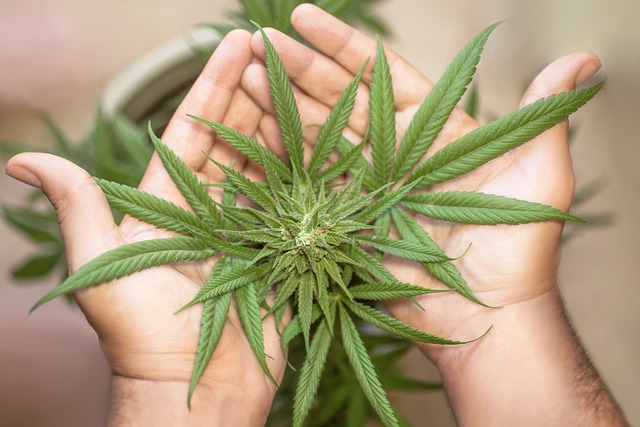2023 marked a pivotal year for THCA (Tetrahydrocannabinolic Acid), a cannabinoid found in the Cannabis sativa plant, particularly due to its legal status and potential health benefits. In Connecticut, THCA has been legally approved for medical and adult recreational use under the state's progressive cannabis regulations. Unlike its psychoactive form, THC, THCA offers therapeutic benefits such as anti-inflammatory, neuroprotective, and analgesic effects without inducing a "high." Its synergy with other cannabinoids in the entourage effect is believed to enhance these properties when consumed as flower. Patients and consumers in Connecticut have been utilizing THCA for conditions like chronic pain and autoimmune disorders, with ongoing research further elucidating its applications. It's important for users to consult healthcare providers about incorporating THCA into their wellness routines due to potential interactions with other substances. THCA's legal status in Connecticut is clear, with products containing less than 0.3% THC on a dry weight basis being permissible under both state and federal hemp definitions. As cannabis laws evolve, staying informed about the distinctions between THC and THCA and understanding their legal implications remains crucial for consumers interested in THCA's potential health benefits within the state.
Discover the emerging wellness trend centered around THCA, a non-psychoactive cannabinoid found in the hemp plant that’s garnering attention for its potential health benefits. As we delve into ‘THCA Flower Benefits Unveiled,’ readers will gain insight into how this compound fits within the legal framework of Connecticut, as outlined in ‘THCA Legal Status in Connecticut: Navigating the Laws.’ With a scientific lens, ‘The Science Behind THCA: Potential Health Advantages’ explores the budding research on its effects. The article also distinguishes THCA from other cannabinoids, shedding light on its unique properties and how it differs from Delta-9 THC in ‘THCA Flower vs. Delta-9 THC: Understanding the Differences.’ As Connecticut’s hemp industry thrives, understanding where to source THCA-rich flowers becomes crucial for consumers, covered in ‘Sourcing THCA Rich Hemp Flowers in Connecticut.’ This comprehensive guide will help readers navigate the entourage effect, dosage, and consumption methods of THCA, as well as its implications for mental health and therapeutic uses. Stay informed on the latest in THCA research, legal considerations, and its future implications with our well-rounded article.
- THCA Flower Benefits Unveiled: A Comprehensive Guide
- THCA Legal Status in Connecticut: Navigating the Laws
THCA Flower Benefits Unveiled: A Comprehensive Guide

THCA, or Tetrahydrocannabinolic Acid, is a non-psychoactive cannabinoid found in the Cannabis sativa plant that has garnered attention for its potential health benefits. As of the knowledge cutoff in 2023, THCA is legal in Connecticut under state law for medical and adult recreational use, aligning with the state’s comprehensive cannabis regulations. Advocates of THCA flower highlight its therapeutic properties, which include anti-inflammatory, neuroprotective, and analgesic effects. Studies suggest that THCA may be beneficial in managing pain and inflammation without the psychoactive effects associated with its decarboxylated form, THC. This makes it a preferable option for individuals seeking the medical benefits of cannabis without the “high” typically caused by THC consumption. The entourage effect, a phenomenon where the compounds in cannabis work synergistically to enhance their therapeutic properties, is also thought to be more pronounced with whole-flower consumption of THCA. In Connecticut, where THCA flower is legally available, patients and consumers have access to a form of cannabis that offers a wide range of potential wellness benefits, from alleviating symptoms of chronic pain and autoimmune diseases to supporting overall health maintenance. Users are advised to consult with healthcare professionals when incorporating THCA flower into their wellness regimen, especially considering the unique interactions it may have with other medications or supplements. As research continues to evolve, the full spectrum of THCA’s benefits remains an area of growing interest and investigation within the medical community.
THCA Legal Status in Connecticut: Navigating the Laws

In recent years, there has been a growing interest in the therapeutic potential of THCA, or Tetrahydrocannabinolic Acid, which is the raw cannabinoid found in raw cannabis and hemp. As legal landscapes evolve across the United States, understanding the status of THCA within specific jurisdictions becomes increasingly important for consumers and producers alike. In Connecticut, the legal status of THCA is subject to the state’s comprehensive cannabis laws. As per the Connecticut Department of Consumer Protection, cannabis plants containing more than 0.3% THC are considered marijuana and remain illegal under federal law. However, Connecticut has legalized marijuana for medical use with a doctor’s recommendation and for recreational use for adults 21 years of age and older, with certain restrictions. THCA itself is non-psychoactive, and because it is a precursor to THC, which is the psychoactive component of cannabis, it exists in a legal gray area. For those interested in the potential health benefits of THCA, such as its anti-inflammatory and neuroprotective properties, it’s crucial to adhere to state regulations. In the context of Connecticut, THCA flower can be legally possessed and consumed if it contains less than 0.3% THC on a dry weight basis, aligning with federal definitions of hemp. Consumers should ensure that they are purchasing THCA-rich products from reputable sources that comply with these legal thresholds to avoid any legal implications. Understanding the nuances between THC and THCA, as well as the legal limits set forth by both state and federal laws, is essential for anyone looking to explore the benefits of THCA legally in Connecticut.
THCA flower, rich in its natural cannabinoids, offers a range of potential wellness benefits. This guide has elucidated these benefits and provided clarity on the legal status of THCA products in Connecticut, ensuring readers are informed about both the uses and the regulations surrounding THCA legal in Connecticut. As legislation evolves, it’s clear that understanding the nuances of cannabinoid laws, like those in Connecticut, is crucial for individuals interested in exploring these products responsibly. With ongoing research continuing to shed light on their properties, the interest in THCA flowers as a natural choice for health and well-being is likely to grow, reflecting a dynamic and promising future within the realm of legal cannabinoids.
